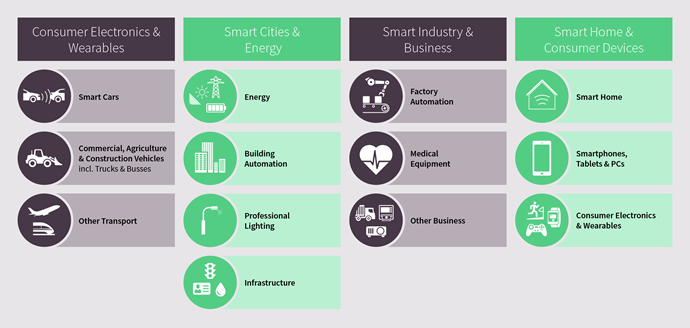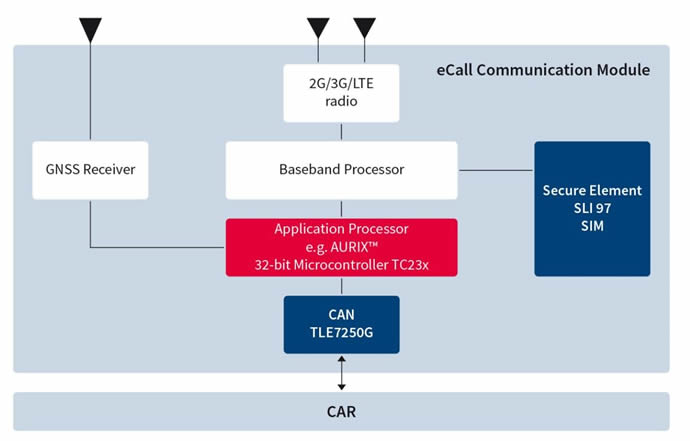The embedded SIM in IoT applications
Eduardo Morral, Product Marketing Manager M2M, Infineon Technologies, highlights how high quality eSIM controllers are becoming integral for industrial automation environments and connected cars.
Reliable machine-to-machine (M2M) communication is a prerequisite for successful Internet of Things (IoT) applications. Whereas communication is always based on the secure identification of sender and recipient, connectivity requirements vary greatly depending on the safety and environmental features of the application.
Cellular M2M communication for example makes a perfect match for connecting machines in areas that are remote and difficult to access with cabled connections. However, they also apply to a large variety for mobile devices that send and receive data - ranging from mobile phones to connected cars.
To overcome the limitations of traditional, removable SIM (Subscriber Identity Module) cards as known from cellular communications, embedded SIMs (eSIM) bring a number of advantages for a smooth adoption of cellular connectivity in IoT devices and related services. To accelerate implementation of eSIMs, the industry is currently defining internationally applicable standards. However, as eSIMs are offered in different quality levels and form factors it is important to choose the right solution depending on the specific application (see Figure 1 below).

In order to address the challenges created by the SIM card in the M2M market, the eSIM or eUICC (embedded Universal Integrated Circuit Card) has been introduced and specified by the GSMA. The GSMA’s Embedded SIM specification provides a single, de-facto standard mechanism for the remote provisioning and management of M2M connections, allowing the ‘over the air’ (OTA) provisioning of an initial operator subscription, and the subsequent change of subscription from one operator to another.
In essence, the eSIM provides the same functionality as traditional SIM cards but in contrast to the latter, it enables the change of operator profiles remotely at any time and comes in a miniaturised, solderable form factor. The concept of the eSIM is basically nothing new. In fact, eSIMs have already been used for M2M applications for several years and many eSIM vendors are providing solutions to manage subscriptions over the air.
The eSIMs for M2M applications are delivered sealed and can be soldered directly onto the circuit board of the device. This increases reliability in terms of reducing malfunction due to shocks, corrosion and other environmental factors. Additionally, the lifecycle of an eSIM with usually ten years and more is longer than that of a standard form factor SIM. This means typically eSIMs do not need to be replaced during the device’s lifecycle.
Another important benefit of eSIMs is their physical security. Soldering the SIM directly onto the circuit of the device makes it nearly impossible for anyone tampering the device to remove the SIM for misuse.
Today eSIMs for M2M applications are typically available in a small MFF2 package (5.0x6.0x0.9mm). The surface mount format provides the same electrical interface as the full size, 2FF and 3FF SIM cards, but is soldered to the circuit board as part of the manufacturing process. In M2M applications where there is no need to change the SIM card, this avoids the requirement for a connector, improving design, reliability and security.

Quality and reliability are key
Historically, SIM cards have been used for consumer devices which means that in many cases they aren’t optimised to work under difficult and rough industrial environments. The promise of highly automated and optimised industrial processes using IoT technologies won’t hold true if a tiny but essential component like the SIM can’t cope with the quality challenges of rough industrial environments (Figure 2 above).
Silicon technologies might react differently to similar operational conditions. For example, some technologies might have higher failure rates at higher temperatures and others at lower temperatures. In order to understand the effects of technology, device manufacturers must work together with the eSIM provider to make sure they are choosing the adequate one. They should also verify that the provider has the right measures in place to guarantee the promised quality such as advance testing, tightened process controls and quality gates as well as advanced mechanisms to protect memory against excessive stress. The application, also known as mission profile, defines how the eSIM will be used, and has a significant influence on the overall failure rate of the eSIM. The mission profile involves understanding the active operational time, the frequency of updates and the size of memory used.
Environmental conditions are normally determined by variables such as moisture, humidity, corrosion, and mechanical and electromagnetic shocks. Yet, the most influential variable is the operational temperature. The temperature ranges from -25°C to 85°C of a traditional SIM card is unlikely to fit the job. Therefore, eSIM solutions are needed, specified for a temperature range of -40°C to 105°C.
Optimisation for M2M applications
Infineon has developed a family of industrial grade security controllers that are well suited for the operation in difficult environmental and usage conditions, enabling secure and reliable cellular connectivity for industrial M2M applications.
The SLM family includes 16-bit and 32-bit security controllers optimised for industrial M2M applications.
The 16-bit SLM 76 controller is optimised to address the needs of a large number of M2M applications, providing a temperature range from -40°C to 105°C, a robust E²PROM cell concept, leading up to 500k cycles per page, high resistance to harsh environmental conditions such as vibration or humidity, achieving ten years of lifetime and ten years’ data retention and low failure rates.
To further improve security of connected industrial devices, the eSIM can be combined with the OPTIGA Trust authentication chips.
Automotive leading the way
M2M offers enormous opportunities for the automotive industry. Drivers for eSIM in cars are emergency call systems (Figure 3 - left) as well as connected car services. The European Commission for example, has selected the eSIM format for its in-vehicle emergency call service (eCall) which will be mandatory for new cars in the EU from 2018 onwards. In the event of an accident where the driver loses consciousness for example, the car places an emergency call.
The various opportunities for connected vehicles also present the automotive industry with particular challenges. While the service life of computers and mobile devices is targeted to a few years and new features can be implemented in the next generation of products, automotive manufacturers must think further ahead and assume a product lifecycle of up to 15 years.
In a connected car, the eSIM is the linking element between the automotive and the telecommunication worlds. While automakers have a strong focus on meeting the highest quality levels, mobile network operators focus on protecting their security credentials against theft and cloning. In addition, the remote management capabilities of the eSIM allow automakers to reduce logistic complexity and easily deploy new services for their customers during the vehicle’s lifetime, for example by using Software-over-the-air (SOTA) updates.
Again, and especially here, quality and reliability of the cellular communication are key. To meet these challenging requirements Infineon offers its SLI 76/97 product families. The SLI families offer 16-bit (SLI76) and 32-bit (SLI97) security controllers optimised for automotive M2M applications. In addition to the SLM features, SLI fulfills the highest automotive standards - the eSIM products provide extended quality targets, PPAP documentation and are qualified according to AEC-Q100. The SLI 97 provides a set of hardware crypto-coprocessors supporting all relevant crypto schemes and Common Criteria EAL 5+ High certification, making it well suited for solutions in secure car connectivity.
Summary
The IoT, with its plethora of new devices and solutions, requires flexible and reliable solutions for M2M communication. Cellular-based solutions provide a secure and cost efficient alternative to wired applications, especially with regard to communication with machines in remote areas or for mobile applications such as connected cars. Infineon has been supplying SIM chips for more than 20 years and has developed a range of specialised eSIM products. Benefitting from a deep cross-market system understanding, high quality solutions for cellular M2M communications can be provided.











